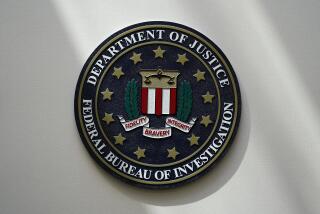U.S. Pressing Anew for Noriega to Quit : Reagan Sends Envoy Back to Panama to Try to Conclude a Deal
- Share via
WASHINGTON — President Reagan sent a special envoy back to Panama on Monday to try to reach agreement on the details of a deal to retire Panamanian strongman Manuel A. Noriega in exchange for dismissal of drug indictments against him.
Deputy Assistant Secretary of State Michael G. Kozak returned to Panama to try to close the deal despite serious objections to the proposal from Vice President George Bush, Treasury Secretary James A. Baker III and Atty. Gen. Edwin Meese III, officials said.
The President told reporters that he had imposed no deadline on the negotiations. “We’re not going by time; we’re going by quality,” he said in response to a question after a ceremony in the White House Rose Garden.
Asked whether he had decided to drop the drug charges against Noriega, Reagan said: “Nothing’s been settled. It’s still in the works.”
Desirable Conclusion
Earlier, Under Secretary of State Michael H. Armacost said the Administration hoped a deal could be concluded before Reagan leaves Wednesday for his Moscow summit meeting with Soviet leader Mikhail S. Gorbachev. “It would be desirable to clear it up while the President’s on our own soil,” he said.
But Armacost also said that Kozak carried “no ultimatum” to Panama. And other Administration officials said it would be a mistake to insist on a quick resolution of the problem, predicting that Noriega will still be in power when Reagan meets with Gorbachev.
“If Noriega thinks we need to get this wrapped up before the summit, that gives him an enormous advantage of leverage,” one official said. “There’s no reason to bend over backward for the guy.”
Kozak, who had spent four weeks in Panama trying to work out a deal with Noriega, was recalled to Washington for consultations last week. Reagan dispatched him back to Panama City on a flight early Monday after a late-night White House meeting Sunday.
Cabinet Divisions
His renewed attempt to nail down the details of an agreement with Noriega reflected Reagan’s decision to move ahead with the negotiations despite the divisions they have created in his Cabinet.
Under the U.S. proposal, Noriega would resign as commander of the Panama Defense Forces in August and go into exile from September until after presidential elections in May, 1989, with a trip back home for the Christmas holidays. In exchange, the United States would drop two sets of federal drug-trafficking indictments returned against the general in February.
The proposal to drop the indictments has drawn public objections from Bush, the apparent Republican presidential nominee, who has been under attack by Democrats for the shortcomings of the Administration’s drug policies. The two U.S. attorneys who brought the charges against Noriega also have protested any move to drop the indictments. One of them, Robert Merkle of Tampa, is scheduled to meet with Meese on the issue today.
Panama’s deposed president, Eric A. Delvalle, added his voice to the protests Monday, saying that the proposed deal with Noriega “would mortgage the future of democracy in Panama for a long time to come.” In a statement issued by Panama’s embassy in Washington, Delvalle complained that the Administration has shut him out of the negotiations.
The United States officially recognizes Delvalle as Panama’s president, although Noriega effectively fired him in February.
Delvalle said the Panamanian opposition would reject any agreement with Noriega that allows him to continue holding political power. On Sunday, National Security Adviser Colin L. Powell said it probably would be impossible to deny Noriega any continuing political role, although that has been one of the Administration’s major goals.
“It’s not clear that we can remove him from actions behind the scenes,” Powell said.
Times staff writers Paul Houston and Ronald J. Ostrow contributed to this story.
More to Read
Sign up for Essential California
The most important California stories and recommendations in your inbox every morning.
You may occasionally receive promotional content from the Los Angeles Times.














